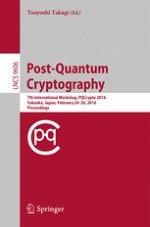2016 | OriginalPaper | Buchkapitel
A Homomorphic LWE Based E-voting Scheme
verfasst von : Ilaria Chillotti, Nicolas Gama, Mariya Georgieva, Malika Izabachène
Erschienen in: Post-Quantum Cryptography
Aktivieren Sie unsere intelligente Suche, um passende Fachinhalte oder Patente zu finden.
Wählen Sie Textabschnitte aus um mit Künstlicher Intelligenz passenden Patente zu finden. powered by
Markieren Sie Textabschnitte, um KI-gestützt weitere passende Inhalte zu finden. powered by
